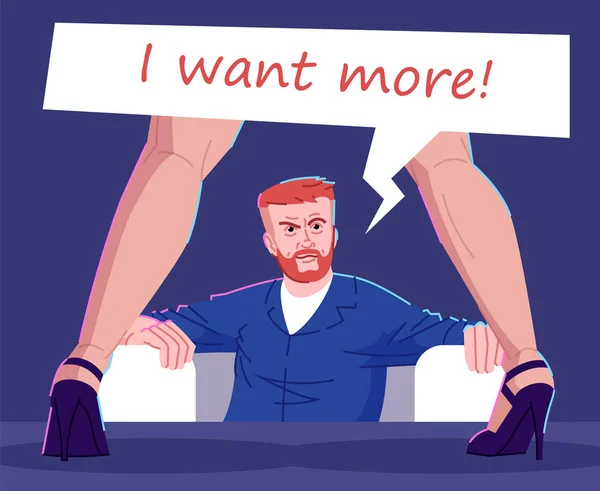Do you have an insatiable sexual appetite? Are you always thinking about sex? Do you find it difficult to control your sexual urges? If you answered “yes” to any of these questions, then you may be suffering from hypersexuality. In this blog post, we will discuss what hypersexuality is, and we will also provide a quiz that can help you determine your level of sexual desire. Stay tuned for more information!
Contents
What Is Hypersexuality?

Sex addiction is another term for hypersexuality. Hypersexuality is defined by a lack of control over sexual thoughts, desires, and impulses. While natural urges are healthy, sex addiction refers to behaviors that go above and beyond normal and have a significant negative impact on one’s life. The hypersexuality quiz is designed to help people determine whether they are hypersexual or not.
Excessive sexual activity is not listed as a diagnosable condition in the Diagnostic and Statistical Manual of Mental Disorders (DSM-5). However, excessive sexual behavior, like chemical addictions, can develop, according to research.
Also, a hypersexual person may have an insatiable desire to be sexually stimulated. However, everyone has such desires from time to time. But a hypersexual person experiences it so much that it starts affecting their daily life activities. Also, hypersexuality can be felt in several forms. For example-
- Sexual acts
- Prostitution
- Watching or consuming pornography
- Masturbation
- Sexual fantasy
This can have serious personal consequences. Like drug or alcohol addiction, sex addiction can have a negative impact on one’s life. It can have an impact on a person’s physical health, mental health, interpersonal relationships, and overall quality of life.
As you may or may not know, Hypersexuality falls under the umbrella of sexual addiction, which itself falls under the umbrella of impulse control disorders. The Diagnostic and Statistical Manual of Mental Disorders (DSM-5) has proposed to discontinue sexual addiction as a stand-alone diagnosis and instead list it under obsessive-compulsive and related disorders. I believe this is because we now recognize that many behaviors we once labeled as hypersexuality actually have their root in an anxiety disorder, such as trichotillomania (hair-pulling), kleptomania (stealing), or even dermatillomania (skin picking).
Hypersexuality Symptoms

A professional should perform a proper diagnosis of hypersexuality or sex addiction. However, the following are some symptoms that may indicate a sex addiction:
- Excessive Sexual Feelings: Someone suffering from hypersexuality may notice that they have constant sexual thoughts. Chronic sex thoughts or sexual fantasies can become obsessive, interfering with other activities or even work.
- Wasting Time Looking For A Sexual Partner: Seeking a partner is not a sign of hypersexuality unless the person devotes an excessive amount of time and energy to finding a sexual partner. If this is the case, it is not a good sign. A hypersexual person is someone who spends an excessive amount of time attempting to have sex or being sexual.
- Excessive Masturbation: A hypersexual may masturbate excessively, at inopportune times, or to the point of physical discomfort. Excessive masturbation may indicate hypersexuality or sex addiction.
- Ignoring Other Daily Tasks: When a person begins to prioritize sex over other responsibilities and activities, he or she is likely to be hypersexual. Also, sex addicts have an impact on things like family relationships, hanging out with friends, work, and socialization.
- Feelings of Shame/Depression: If a desire for sex becomes an addiction, it may be accompanied by feelings of anxiety, shame, sadness, or remorse. However, the individual may be embarrassed by their sexual desires and the difficulty they have in controlling them. Also, those who are drawn to children are more likely to exhibit clinical depression symptoms or suicidal ideation. Furthermore, in studies, it is not uncommon for people who are sexually compulsive to show signs of depression, anxiety, and social anxiety. Depression symptoms were present in 28% of sexually compulsive males, compared to 12% of the general population.
The Hypersexuality Quiz
A hypersexuality quiz is a screening tool for people who may be suffering from hypersexuality. Please select the most truthful answer to this hypersexuality quiz for hypersexuality diagnosis-
1. Do you believe your sexual behaviors are unusual?
- Yes
- No
2. Do you have a history of impulsive sexual or non-sexual behavior?
- Yes
- No
3. Do you recall anything sexually abnormal that happened to you as a child?
- Yes
- No
4. Do you lead a double life and feel compelled to keep your sexual behavior hidden from your partner?
- Yes
- No
5. Are your sex needs causing you to have sex with people or in places you wouldn’t normally choose?
- Yes
- No
6. Do you find yourself drawn to screening for sexually arousing objects, materials, magazines, pornography, erotic text, sex scenes, and so on like a magnet?
- Yes
- No
7. Do you have trouble concentrating on tasks because your mind wanders to sexual fantasies?
- Yes
- No
8. Do you use sex to relieve stress, anxiety, or boredom?
- Yes
- No
9. Do you worry about being asexual? Do you avoid sexual relationships and sexual ideas?
- Yes
- No
10. Do you find the thought of sex or sexual body parts and fluids repulsive?
- Yes
- No
11. Do you experience remorse, guilt, or shame as a result of your sexual activities?
- Yes
- No
12. Do you abstain from all sex for an extended period of time after engaging in sexual behavior?
- Yes
- No
13. Do you notice that your new relationships are developing the same destructive patterns that destroyed your previous ones?
- Yes
- No
14. Do you have multiple sexually romantic relationships going on at the same time?
- Yes
- No
15. Do you have a hard-to-break habit of using sex workers or escorts to satisfy sexual cravings?
- Yes
- No
Hypersexuality Quiz Answers
The answers to this hypersexuality quiz can assist you in determining whether you are hypersexual. Or display signs of hypersexuality. It also determines whether you are at risk of developing hypersexuality.
If 50% of the answers to this hypersexuality quiz were “yes.” Then you have a high chance of being hypersexual and possibly a sex addict. To treat this condition, see a doctor or a sex therapist.
However, it’s critical to remember that these answers aren’t always correct. Consult a doctor or a professional before deciding whether you are hypersexual.
Root Causes of Hypersexuality
Some people are beginning to wonder what causes hypersexuality. This is a difficult question to answer. However, a variety of factors can contribute to the development of hypersexuality in people. This includes the following:
- Genetics and hormones are examples of biological factors.
- Also, mood disorders and trauma are examples of psychological factors.
- Social and situational factors– Social factors include feeling disconnected from society or feeling unable to connect with other people sexually, abuse or neglect as a child, being bullied or teased about one’s body, family background, or a lack of caregiving as a child. Also, as a means of escaping from these issues, one may become hypersexual.
- Sleep Deprivation– Sleep deprivation has been linked to increased sexual arousal and desire. This is due, in part, to their lack of sleep, which causes an increase in cortisol levels as well as a decrease in the number of sex hormones secreted by the body, such as testosterone.
- Higher sex hormone levels– People with higher sex hormone levels are more likely to become hypersexual. Low levels of sex hormones cause a person to feel depressed and menopausal-like, whereas high levels of these hormones are associated with feelings of being aroused, strong, powerful, confident, dominant, aggressive, energetic, and younger in appearance. This is because higher levels of sex hormones promote muscle development, fat burning, bone mass growth, hair growth, tooth enamel strengthening, skin thickening, and overall well-being. This is why men are frequently irritable when their sex hormone levels are low. Also, they must rely on an outside source to produce these chemicals in their bodies.
Hypersexuality/Sex Addiction Treatment

Treatment for hypersexuality is possible with the assistance of a sex therapist, psychiatrist, psychologist, or other mental health professional. Also, hypersexuality is usually caused by some kind of stressor or emotional problem. Consequently, a sex therapist can assist in treating the underlying causes of hypersexuality.
A hypersexual person’s treatment options include:
- Cognitive-Behavioral Therapy (CBT): This type of therapy is used to help a person change their thoughts, feelings, and behaviors.
- Dialectical Behavior Therapy (DBT): This type of therapy helps a person manage difficult emotions and stresses. It can be helpful for people with borderline personality disorder or for those who struggle with impulsive behavior.
- Individualized therapy: This type of therapy is tailored to the specific needs of the person.
- Group therapy: This type of therapy involves meeting with a group of people who have similar problems.
- Medication: A doctor may prescribe medication to help treat hypersexuality.
Moreover, other treatment methods include inpatient treatment with EMDR (Eye Movement Desensitization and Reprocessing) and couples therapy/marriage counseling.
Also, if you’re concerned about your level of sexual desire, take this quiz to find out if you have signs of hypersexuality. This quiz will help you determine whether you need to see a doctor or a sex therapist.
Conclusion
If you’re concerned about your own hypersexuality, don’t be. Also, we’ve provided some resources to help you better understand this type of sexual behavior and how it differs from other sexual disorders that may require medical attention. Remember that what’s most important is for everyone who has questions or concerns to talk openly with their doctor about these issues so they can get the treatment they need. Also, your confidentiality will always be respected at our clinic, no matter what question you have about sex drive – we’ll work together to find a solution that meets your needs!
A Word From Therapy Mantra
Your mental health — Your psychological, emotional, and social well-being — has an impact on every aspect of your life. Consequently, positive mental health essentially allows you to effectively deal with life’s everyday challenges.
At TherapyMantra, we have a team of therapists who provide affordable online therapy to assist you with issues such as depression, anxiety, stress, workplace Issues, addiction, relationship, OCD, LGBTQ, and PTSD. You can book a free therapy or download our free Android or iOS app.



